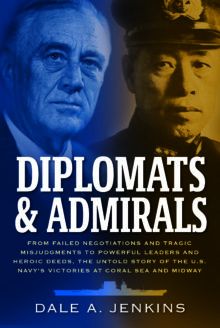
Dale Jenkins
New York City
Author of DIPLOMATS AND ADMIRALS: From Failed Negotiations and Tragic Misjudgments to Powerful Leaders and Historic Deeds, the Untold Story of the U.S. Navy’s Victories at Coral sea and Midway
BOOK COVER

BOOK DETAILS
Pub Date: December 1, 2022
Genre: Nonfiction / History
Publisher: Aubrey Publishing Co.
Formats, ISBNs & Prices:
- Hardcover: 979-8-9865626-1-2, $29.50
- Paperback: 979-8-9865626-0-5, $19.50
- E-Book: 979-8-9865626-2-9, $9.99
- Offset Book: $29.50
ABOUT THE BOOK
Diplomats and Admirals: From Failed Negotiations and Tragic Misjudgments to Powerful Leaders and Historic Deeds, the Untold Story of the U.S. Navy’s Victories at Coral sea and Midway recounts the escalating confrontation of diplomats on opposite shores of the Pacific Ocean prior and during World War II.
The story begins with U.S. President Franklin D. Roosevelt and Admiral Isoroku Yamamoto of Japan. Two men on opposite sides of the world, with starkly different childhoods that grew into brilliant and enigmatic leaders, coming of age in a world rapidly churning with super powers angling to establish political, military, and economic dominance.
Diplomats and Admirals argues that the war in the Pacific was the result of internal divisions in both the United States and Japan, and possible duplicity within the Roosevelt administration.
Going Deeper — After continued Japanese expansion in the Pacific in 1941 and the total oil embargo imposed by Dean Acheson, the threat of war escalated. Japanese Prime Minister Konoe realized war with the United States would be disastrous for Japan. He made strenuous attempts to arrange a summit meeting with President Roosevelt but was continually rebuffed by Secretary of State Cordell Hull and his pro-China advisors Stanley Hornbeck and Alger Hiss. Roosevelt’s War Council, oblivious to the power of the Japanese Navy, believed the oil embargo would force Japan to withdraw from southern Indo-China. An agreement with Japan was within reach at the end of November 1941, but Chiang Kai-Shek and Madame Chiang exerted powerful lobbying pressure to prevent an agreement – they wanted the United States in the war to aid China. In response, Hull delivered a demanding diplomatic note, known forever as the Hull Note of November 26, which the Japanese viewed as an ultimatum. The result was Pearl Harbor.
On the morning of December 7, 1941, 353 Japanese planes from six aircraft carriers attacked Pearl Harbor. The next day, President Roosevelt went before Congress, depicted the attack as a day of infamy, and rallied the US populace to pursue a righteous victory. Congress declared war on Japan.
Diplomats and Admirals penetrating historical descriptions and insights before and during WWII and across continents and oceans, culminates at the Battle of Midway, where U.S. Navy carrier pilots snatched victory from defeat in the last possible moments– a decisive victory that stopped further Japanese expansion and turned the momentum of the Pacific War from Japan to the United States.
Diplomats and Admirals is a must-read for history, military and political aficionados.
ABOUT THE AUTHOR
Dale Jenkins’ fascination with international affairs, history and the Navy has been a life-long endeavor. He is a former U.S. Navy officer who served on a destroyer in the Pacific, and for a time was home-ported in Yokosuka, Japan. Pacific Fleet commitments took him to the Philippines, Taiwan, South Korea, Hong Kong and Singapore. While on active duty, he was awarded the Navy and Marine Corps Expeditionary Medal. After the Navy, Jenkins began a career in international banking and as a staff director at the Council on Foreign Relations in New York.
Jenkins currently serves on the Samuel Eliot Morison Committee of the Naval Order of the United States, New York, and as a Regional Director of the Naval War College Foundation. As a result of his active duty experience and new revelations, Dale provides insights into the diplomacy and strategies of the Pacific region. He has degrees in history and business from Harvard and Columbia University.
TALKING POINTS
Texas is becoming a real player in the world of whiskey. Andrew can discuss some of the things that make Texas whiskies special, and how particular grains and climate can play a major role in flavor profiles
The difference between pass whiskey, white whiskey, and aged whiskey
Texas has become a mecca of craft spirits distilleries: the major players + Andrew’s favorites
How did Texas distillers exhibit a pragmatic approach to whiskey production and consumption?
After home distilling for many years, Andrew Braunberg (with partners) founded Still Austin Whiskey Co, the first whiskey distillery in Austin, in 2017. Andrew can discuss his experience, successes and failures with this new (mis)adventure.
Why Texas set a higher standard for Texas whiskey and said no to the standard set by the Pure Food and Drug Law
Prohibition and vice: two sides of the same Texas story

BOOK DETAILS
Pub Date: December 1, 2022
Genre: Nonfiction / History
Publisher: Aubrey Publishing Co.
Formats, ISBNs & Prices:
- Hardcover: 979-8-9865626-1-2, $29.50
- Paperback: 979-8-9865626-0-5, $19.50
- E-Book: 979-8-9865626-2-9, $9.99
- Offset Book: $29.50

